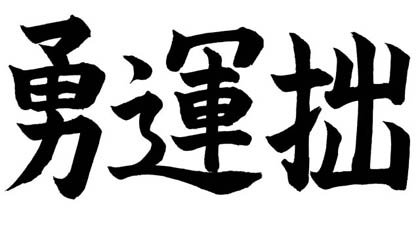Iaido glossary
Iaido Glossary – Dictionary
Extensive Glossary/Dictionary more than just iaido/kendo terms …
Glossary/Dictionary ordered alphabetically
Iaido concept in French (Français)
Terms you should know …
Jo Ha Kyu
Jo-ha-kyu is the continuous acceleration applied to the execution of most sword drawing techniques. Each movement of a kata begins slowly, gradually gets faster and until maximum speed is attained. This increase of speed produces sharp technique. The first technique of the first kata (nukitsuke in Mae) is a good example of the use of jo-ha-kyu.
Jo: Serene introduction / Slow
Ha: Extended and narrative information. / Faster
Kyu: An ending which is surprisingly sudden / ‘kyu’ is very rapid, coming to an abrupt cessation of action.
Every movement, action has a ‘Jo Ha Kyu’ action.
FYI: Peter Boylan and Jeff blog
Merihari
Merihari refers to the overall pacing of a kata, the way that some places are emphasized, some more quiet, and especially how all that ties together. It’s what prevents a kata from being mechanical.
Merihari means modulation which I believe in musical terms means reducing the intensity of certain sounds in order to amplify the effect of “larger” sounds. In budo it normally refers to the contrast between extremes i.e. the connection between hard and soft, fast and slow, still and active. While kankyukyojaku refers to the extremes themselves, merihari refers to the “connective tension” between them.
Anyway, the article uses the word merihari which means “pleasantly modulated” or “appealingly varied”. (Update: see comments for correction.) I’ve known and liked this word for a while but I realized that I had no idea why it meant what it meant, so I looked it up.
The /meri/ is from meru, a verb meaning “decrease”, “weaken”, or/and this is the relevant meaning to merihari “become lower in pitch”. meru itself has basically become extinct, although it survives in the not uncommon compound verb merikomu, “sink into [something]”.
The /hari/ used to be /kari/, from the verb karu meaning “become higher in pitch”. I don’t remember hearing the word before, but I bet it’s still in use among traditional Japanese musicians. (I have the feeling that I may have read it before and assumed it was a pre-modernization-okurigana version of agaru, “rise”.)
So together, the original phrase was merihari, literally “lows and highs”, applied only to music. According to SUGIMOTO Tsutomu’s Gogenkai, usage then spread through acting (specifically, delivery of lines) and finally exploded into the rest of the world.
Taken from kendo-world forum for more detail go to: .1 and .2
Kan (緩) slow – Kyu (急) quick – Kyo(強) strong – Jaku (弱) weak
Kankyukyojaku refers to the extremes of characteristics of movement and posture: hard/soft, fast/slow, weak/strong etc etc etc. jo-ha-kyu refers to the way an action starts slowly and softly and accelerates/hardens to the point of maximum speed/hardness at the cut. Seme/tame refer to pressing forward and holding back.
Kigurai
It’s not something that you “do” Intentionally, you can’t just “put it on and off”. This term has been translated as “the strength or commanding presence derived from confidence acquired through repeated practice” “Experience” (All Japan Kendo Federation, Japanese- English Dictionary of Kendo, 2000), an almost identical definition being given in the Zen Nippon Kendo Renmei Iai Manual, but these only cover the basic tenets of what kigurai means.
It’s an unquestioned faith in your own ability and experience, the sure self-knowledge that you can do what you’re asked to do without fuss and bother.
Not something you can pretend to have or play at, just something that, like fukaku, you accumulate with years of doing whatever it is you do.
These things belong to the “school of hard knocks” more than to the “Institute of Advanced Talking-About-It”.
Fukaku
Fukaku literally: deeply. Depth of personal character due to training



